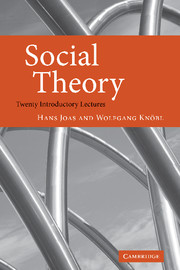Book contents
- Frontmatter
- Dedication
- Contents
- Introduction
- I What is theory?
- II The classical attempt at synthesis: Talcott Parsons
- III Parsons on the road to normativist functionalism
- IV Parsons and the elaboration of normativist functionalism
- V Neo-utilitarianism
- VI Interpretive approaches (1): symbolic interactionism
- VII Interpretive approaches (2): ethnomethodology
- VIII Conflict sociology and conflict theory
- IX Habermas and critical theory
- X Habermas' ‘theory of communicative action’
- XI Niklas Luhmann's radicalization of functionalism
- XII Anthony Giddens' theory of structuration and the new British sociology of power
- XIII The renewal of Parsonianism and modernization theory
- XIV Structuralism and poststructuralism
- XV Between structuralism and theory of practice: The cultural sociology of Pierre Bourdieu
- XVI French anti-structuralists (Cornelius Castoriadis, Alain Touraine and Paul Ricoeur)
- XVII Feminist social theories
- XVIII A crisis of modernity? New diagnoses (Ulrich Beck, Zygmunt Bauman, Robert Bellah, and the debate between liberals and communitarians)
- XIX Neo-pragmatism
- XX How things stand
- References
- Author index
- Subject index
XIII - The renewal of Parsonianism and modernization theory
Published online by Cambridge University Press: 05 June 2014
- Frontmatter
- Dedication
- Contents
- Introduction
- I What is theory?
- II The classical attempt at synthesis: Talcott Parsons
- III Parsons on the road to normativist functionalism
- IV Parsons and the elaboration of normativist functionalism
- V Neo-utilitarianism
- VI Interpretive approaches (1): symbolic interactionism
- VII Interpretive approaches (2): ethnomethodology
- VIII Conflict sociology and conflict theory
- IX Habermas and critical theory
- X Habermas' ‘theory of communicative action’
- XI Niklas Luhmann's radicalization of functionalism
- XII Anthony Giddens' theory of structuration and the new British sociology of power
- XIII The renewal of Parsonianism and modernization theory
- XIV Structuralism and poststructuralism
- XV Between structuralism and theory of practice: The cultural sociology of Pierre Bourdieu
- XVI French anti-structuralists (Cornelius Castoriadis, Alain Touraine and Paul Ricoeur)
- XVII Feminist social theories
- XVIII A crisis of modernity? New diagnoses (Ulrich Beck, Zygmunt Bauman, Robert Bellah, and the debate between liberals and communitarians)
- XIX Neo-pragmatism
- XX How things stand
- References
- Author index
- Subject index
Summary
In the preceding four lectures we outlined the most important attempts at synthesis made in the 1970s and 1980s; these aimed to fuse differing theoretical traditions and advance to a new grand theory à la Parsons. Do not let this lead you to false conclusions. Our claim that the centre of theoretical gravity shifted to Europe from around 1970 is not meant to imply that American sociology subsequently played no role at all theoretically. And our observation that Parsons was sharply criticized by neo-utilitarians, symbolic interactionists, ethnomethodologists and conflict theorists does not mean that the edifice of Parsonian thought lost all its appeal in the 1970s and 1980s. Rather, it became apparent that his highly comprehensive, multilayered, if sometimes inconsistent work offered a good deal of room for differing interpretations, enabling followers of Parsons to pursue their own paths, more or less independent of the thought of the ‘master’. Above all, Parsons' theory of social change offered much scope for comprehensive revision. Parsons himself had in fact never stopped developing his ideas in this field (see Lecture IV). Yet because his evolutionary arguments became increasingly abstract, he could only go so far. The historical vagueness of such constructions generally held little appeal for those sociologists intent on serious empirical work.
This was the point of departure of so-called modernization theory, which can be understood only in light of Parsons' work but which was at variance with it in crucial respects. What is modernization theory? Simply put (on what follows, see Knöbl, Spielräume der Modernisierung, pp. 32f.), this was a theory of social change that attempted to grasp the developmental history of societies through comparative historical analysis.
- Type
- Chapter
- Information
- Social TheoryTwenty Introductory Lectures, pp. 308 - 338Publisher: Cambridge University PressPrint publication year: 2009

